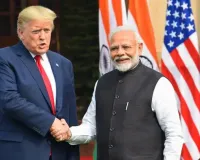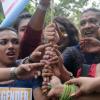Bangladesh: Never neutral, interim govt led by Yunus unmasked before elections

National Citizen Party (NCP), on the other hand, expressed desire to contest alone in all 300 seats, although stating its openness to coalition with other parties. Amidst this, the announcement of Asif Mahmud, the student advisor of the interim government, to contest in the forthcoming election from a Dhaka constituency, was much awaited. However, this pronouncement unmasks the interim government’s neutrality, long contested by political parties. And thus begins the anticipation — will the upcoming election be free and fair?
Since the beginning of this year, the interim government’s neutrality came under scrutiny as a new political party — the National Citizen Party (NCP) — came into being, a party formed by student leaders of the 2024 July Uprising. Established on 8th August 2024, the interim government included three student advisors — Nahid Islam, Asif Mahmud and Mahfuz Alam — who were also core leaders of the Uprising.
One of them, Nahid Islam, resigned from his advisory position this February to join the NCP as its chief convenor, leading to allegations against the interim government sustaining the establishment of a ‘King’s Party’ instead of fulfilling political parties’ demand of announcing an election roadmap.
Indeed, Chief Advisor Muhammad Yunus has shown partisanship towards the NCP, given that student leaders were the one supporting (and inviting) Yunus to hold this position in the interim government. This is notwithstanding the revelation by Youth, Labour and Sports advisor Asif Mahmud of Bangladesh Army Chief’s reservations about students’ decision of inviting Yunus, in a video of Mahmud shared by NCP chief (South) Hasnat Abdullah back in March.
Much before the formal establishment of the NCP, Muhammad Yunus’s interim government parroted the same narrative as that of student leaders of the July Uprising, taking measures suiting their demands. Nowhere has this been more prominent than in a series of official measures targeted to erase Sheikh Mujibur Rahmas’s legacy, to the extent of stripping him of his title of ‘Father of the Nation’. Taking the hands of these July Uprising leaders, the interim government resorted to historical revisionism of the Liberation War, raising a new political discourse of ‘new Bangladesh’ — where Bangladesh is believed to attain ‘real liberation’ on 5 August 2025, the day Sheikh Hasina was forced to flee the country.
Following NCP’s formation, the interim government has accepted many of its demands, even before the party’s official registration in the Election Commission. The official ban on Awami League in May via amendment of 2009 Anti-Terrorism Act, barring it from contesting in the national election came only after NCP hit the streets. This ban on a party, rather than individuals accused of war crimes, has been claimed as undemocratic by international rights organisations. League’s ban has been NCP’s main goals, one that Yunus conceded to, as evident in his earlier statements where he expressed the decision on Awami League’s participation in election to be left to the League itself.
In line with NCP’s demands, the interim government has paid excessive attention to reforms, while keeping Bangladesh’s democratic transition via election in the backseat. This has led to political parties’ accusing the interim government of giving administrative benefits to people (referring to Nahid Islam) who left the government to form their own party—thus the interim government facilitating the establishment of a ‘King’s Party’ to derail the election. The two student advisors—Asif Mahmud and Mahfuz Alam—of the interim government have also been accused of being ‘NCP loyalists’ around the same time and political parties demanded for their resignation, as they have violated the expected neutrality of the interim government which is to ensure free and fair political democratic transition.
The July Charter is another area where the interim government displayed its tilt towards the student-led party. Only after a threat by NCP to declare the July Charter on their own, the interim government announced the July Declaration on 5 August and gave it constitutional recognition, fulfilling yet another NCP’s agenda. The July National Charter, announced on 17 October, further incorporated many of NCP’s demands—which were opposed by the now largest political party BNP along with other parties. These are—public referendum on reforms included in the July Charter which also includes 48 constitutional reforms and omission of notes of dissent in the implementation process of the July Charter, moves that drew controversy for bypassing legal parliamentary process and undemocratic enforcement, leaving consensus out of the July Charter. The Charter also excluded the basic constitutional principles based on liberation aspirations (nationalism, socialism, democracy and secularism), closely aligning with NCP’s demands whose vision is to put the final nail to the 1972 ‘Mujibist’ Constitution.
It was the implementation process of the July Charter and the finalisation of the election roadmap in October that again raised fresh accusations of the interim government’s neutrality being compromised. Parties, especially BNP and Jamaa, alleged that the Charter implementation process to show political biasness (towards NCP), and pressed for removal of party-affiliated individuals from the interim government (supposed to assume the role of caretaker government before election) hinting at student advisors Mahfuz Alam and Asif Mahmud, who are believed to be NCP loyalists. Following meetings with party representations with the Chief Advisor, raising concerns on neutrality compromising free and fair polls, the top echelon of the government asked the two student advisors to step down.
Both advisors requested more time to reach their decision on resignation. While Mahfuz Alam, Information and Broadcasting advisor, still has not shown any interest in contesting for the upcoming election, local government advisor Asif Mahmud recently announced that he will contest election and will resign from his administrative position before that. While he has not yet revealed if he would contest the election as an independent candidate or via any party (NCP), Mahmud’s late revelation unveils that the interim government never being a neutral administrative body in the first place.
Mahmud also proved his earlier press report true where he opined that “advisors who intend to join politics should resign after election announcement… otherwise the election will be questioned.” With only two months left for national election, the political tense environment in Bangladesh and interim government’s neutrality unmasked confirm that 13th national election will neither be inclusive, nor free and fair.
About The Author
Welcome to Aryan Age, an English newspaper that has been serving readers since 2011 from Delhi. With a loyal circulation of over 19,000, we are dedicated to providing our readers with the latest news and information, as well as insightful analysis and commentary that help them navigate the complex and rapidly changing world.










Comment List